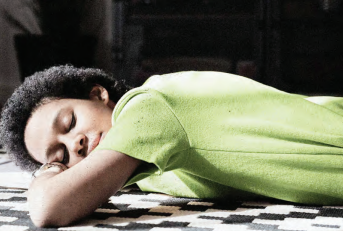Whether you’re thinking about sleeping on the floor as a short-term solution or a long-term lifestyle choice, it’s critical to understand the potential consequences before making a decision. So, let’s dive in and explore the negative effects of sleeping on the floor.
The flooring of every home is either made of concrete, tiles, wood, or other materials that are suitable for walking and sitting for a short period. There is no cushioning on the floor, and no matter how hard you try, it can’t be as comfortable as a mattress. A mattress is made up of a combination of soft and firm foam, springs, and textiles. These are designed to provide comfort for your body while you sleep. A mattress contours and conforms to your body to provide comfort, allowing you to sleep comfortably. Also, in order to rest, our muscles and bones require both firmness and plushness, but in balance. Which you can’t get on the ground. A floor can never be soft and comfortable, and it can never provide you with the comfort you need to sleep and relax. You might also feel a lot of pressure on your neck, which can make it difficult to sleep. You might even feel like you’re lying on a board, which isn’t very comfortable.
You May Develop Back And Joint Pain
Sleeping on the floor might be difficult since it is not meant to give the same degree of support and cushioning as a bed and mattress. Sleeping on a stiff surface can result in pressure areas on the body, such as the hips, shoulders, and back, resulting in discomfort and suffering. Furthermore, a lack of cushioning and support can cause the spine to misalign, resulting in improper posture and even chronic pain. This is especially harmful to people who are injured, recovering from an accident, have an old injury, or are suffering from backache, joint discomfort, or muscular pain. In such instances, sleeping on the floor might intensify the discomfort and worsen your pain. This will cause you to experience stiffness and pain when you wake up in the morning
Can Make You Cold
To sleep comfortably, our bodies must maintain a certain level of warmth. When we achieve this level of warmth, our bodies gradually begin to warm up, and we become comfortable and fall asleep. While lying on a bed, the foam and fabrics adjust to your body temperature and the temperature of the surrounding environment and become comfortable enough to sleep. However, floors are typically frigid and chilly. Concrete, tiles, and other non-insulated materials do not warm up and stay cool in all weather conditions.This can lead to the growth of germs, microbes, and odour
You May Be Exposed To Insects And Pests
It can also expose individuals to potential insects, pests and pet allergens. Most insects, like cockroaches, mice, lizards and other pests get out of their hiding at night and wander on the ground, spreading harmful germs and bacteria. This can increase the risk of being bitten or stung by insects or coming into contact with pet dander and other allergens that may be present on the floor. And if you are sleeping on the floor chances are these insects and pests may come in contact with and leave their germs on you or near you. Leading to many health issues.
Sleeping on the floor can affect your body in a number of ways. It can lead to pain and discomfort in your joints and muscles, as well as poor posture and alignment. It can also disrupt your sleep, leading to insomnia and other sleep disorders. Additionally, sleeping on the floor may expose you to dust, allergens, and other harmful particles that can negatively impact your overall health. While some people may find that sleeping on the floor has its benefits, it is important to weigh these benefits against the potential risks to your health.











